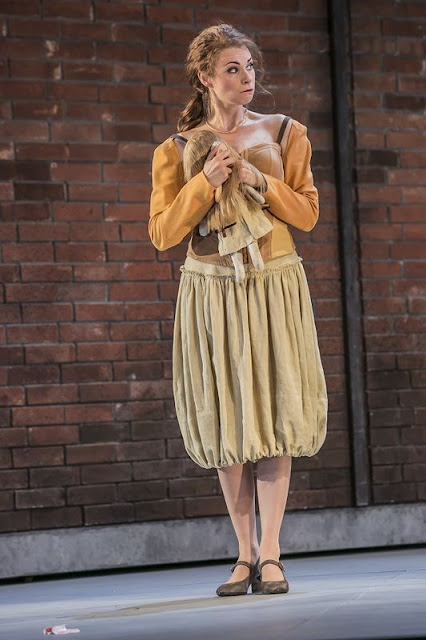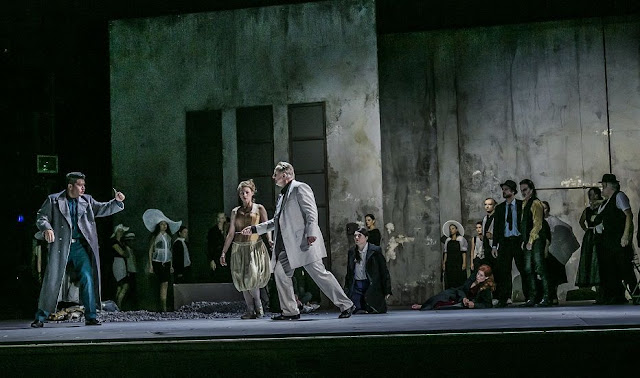Bizet - CARMEN - Theater Regensburg
Musikalische Leitung
|
Tetsuro Ban
|
Inszenierung
|
Hendrik Müller
|
Bühne und Kostüme
|
Claudia Doderer
|
Dramaturgie
|
Ruth Zapf
|
Carmen
|
Vera Egorova (AYNpmn) / Vera Semieniuk
|
Don José
|
Yinjia Gong
|
Micaëla
|
Anna Pisareva / Theodora Varga
|
Escamillo
|
Seymur Karimov / Adam Kruzel
|
Zuniga
|
Mario Klein / Jongmin Yoon
|
Frasquita
|
Martina Fender
|
Mercédès
|
Vera Semieniuk / Beata Marti
|
Le Dancaïre / Moralès
|
Matthias Wölbitsch / Hugo LaPorte
|
Le Remendado
|
Matthias Laferi / Angelo Pollak
|
La Mère / Lillas Pastia
|
Doris Dubiel
|
“... In Hendrik Müllers production, <Carmen> is the gripping story of two outsiders, whose characters Müller presents in a vividly manner, emphasizing new accents. This staging presentation immediately makes sense and is strongly based on the music. [...] The musical concept is as stringent as the staging concept, will certainly provide heated discussions... "
"... Very violent, almost unbearable scenes are counteracted by echoes of a revue that run through the staging. [...] This is not a pleasant-smooth production, but one with rough edges ..."
(Claudia Böckel - Mittelbayerische Zeitung)
"... A very harsh, aggressive interpretation ..."
(Peter Jungblut - Bayerischer Rundfunk)
"... Hendrik Müller's staging of George Bizet's opera is a brilliant experience. [...] Already during the overture, Carmen was brutally raped; one scene later there is a consensual, but still bizarre act of copulation under the Madonna-statue Carmen's and Don Jose's world are formed by sexual violence and exercise of power. Müller admits his Carmen a certain amount of self-confidence. She tries to be an independent woman, for which she does not need the kitsch clichés of castanet-rattling wickedness.
But this freedom, which she repeatedly propagates, is an imaginary one: the world in which she lives, dominated by male fantasies and violence, does not tolerate her rebellion. From the very beginning on, she is abused; emotionally and physically.
What at first looks, as if the victim role would be reserved only for the woman, arises in Don José's psychology: With a pronounced Oedipus complex, he wanders through life and tries to find support in fulfilling the given rules. It begins as an obsessive-compulsive disorder and ends in a full-blown psychosis: if Carmen doesn't want to submit to him - and that is the only thing that means "love" in this Bizet interpretation - he has to kill her. Not so much because of obsession or sexual desire, but because it disturbs the order of his laboriously built up worldview. Since her death does not change the existential desperation of Don José, all that remains is suicide. [...] There are no winners here, only losers in a society shaped by predatory capitalism ... "
(Judith Werner - samtundselt.de)
"... Fascinating <Carmen> psychograms - - -
At the Theater Regensburg, Hendrik Müller staged a fascinating character portrait of Georges Bizet's world success: that of a young booby from the village joins the military, who does what he is told, and who does not know what he wants himself. [...] In the end, Carmen will have to force the knife on him, with which he kills her - and with which cuts his own throat a second later. [...]
Müller packed everything he needs for his <Carmen> into this first act: the fascist military as a macho-gang, suppressed sexuality and open brutality, paid love and a raped Carmen. [...] At first you might miss the usual Spanish ambience, but when the four acts increasingly come to the escalation of José tragedy, one gladly accepts the empty void for Müller's impetus. [...] The weak man between strong women. This, was drives Müller, and he is staging it in an interesting, fascinating way ... "
(Uwe Mitsching - Bayerische Staatszeitung)
"... Nowadays, one expects from director of <Carmen> to remove the dust of superfluous pomps , but simultaneous, to keep the dramatic substance and thus the captivating power of the work. In his new staging, Hendrik Müller performs this feat absolutely outstanding..."
(Onetz.de)

























